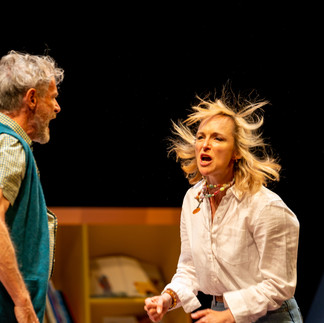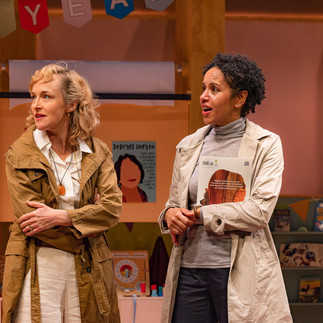Review: Eureka Day at The Dunstan Playhouse
- Theatre Travels

- Nov 19, 2021
- 3 min read
Review by Matthew Hocter
Given everything that has taken place over the last two years, one would think that going to a play about the debate surrounding vaccination, quarantining and good old fashioned blame, would be the last things any of us want to endure for two hours. Wrong. This time, art imitating life (although this was written years before the current pandemic) is providing an insightful, sometimes comedic, and incredibly cathartic approach to what it truly means to listen to all the voices at the table. Clearly, easier said than done.
Director Rosalba Clemente brings Jonathan Spector’s Eureka Day to life on her return to The State Theatre Company South Australia with a deep dive into topical subjects like social justice, idealism and inclusivity, to name but a few. Set at the Eureka Day School in Berkley, private schooling with a progressive form of idealism at its core. Rather than the traditional voting system, Eureka Day works on a consensus basis, where “everyones” voice is important. Throw in some strong personalities and ones that have been silenced by the system, it doesn’t take long to see that this play is so much more than just the stock standard arguments presented around the aforementioned topics, and more about societies inability to truly listen.
Centred around the makeshift discussion table within one of the schools classrooms, the five characters all take their turn (or attempt to for two of them) at discussing a recent outbreak of mumps at the school. As the five members of the committee discuss/attempt to draw a consensus on a new category for the schools website (“transracial adoptee), the groups newest member, African-American Carina (played by Sara Zwangobani) who also happens to be a single Mother, finds herself in the midst of white wokeness. A place that supposedly values all voices and opinions as valid and equal, Suzanne (played by Caroline Craig) asserts her well meaning, ill informed and somewhat dogmatic views, forcing the others to be silenced.
As Don (played by Glynn Nicholas), the schools principal, attempts to mediate and appease the ongoing discussion(s), others in the group like Eli (played by Matt Hyde) and Meiko, the only other person of colour at the table, (played by Juanita Navas-Nguyen) find themselves also on the outside for different reasons, which in turn brings them together in another much more profound way.
At times I found the obsession by the characters to not offend, which sadly ended up offending more often than not, almost nauseating. And that was the plays intention. Whilst the play had no idea of what was to come just a few years after its release with the state of the world we are currently in, it was and is a true reflection on where society at large has landed. With the usage of terms like “Neuro Diversity” and a never ending fixation on (the three caucasian characters) perception. One line in the play, “Ignorance is a communicable disease” broadcast on a massive screen from a live stream meeting was hilarious and really sums it all up. Toxic positivity and gratitude to the point of vomiting, highlighted just how far going in the opposite direction can almost equal that of what you are fighting against.
As the second act explored the characters individually and the layers to their personalities, the conversations surrounding vaccine and quarantine were also still there, especially as it had now affected the group on a personal level. Presumptions about Carina were also given light and Meiko, in all her glorious knitting and quietly observing from the sidelines, also had her moment to assert strength and opinion, even if it came about as a last straw from dominating personas and ridiculous opinions.
At its core, Eureka Day is about community and what that means for each individual. Opinions abound, right or wrong, but the “why” and the “how” are just as important to each of these characters reasons for being for or against vaccination. Many times our stories are not heard and from this, a narrative is created that often forms a protective barrier over the underlying causes of how we got to said opinion, place or idea. In all the effort to create a space that was meant to thrive on equality and inclusivity, somewhere along the way dominance reared its ugly head and those that have been silenced on a systemic level over centuries, people like Carina and Meiko, found themselves still in silence, this time being blanketed by words like “progressive” under a false ideal of what inclusiveness should really mean.
A brilliant piece of theatre that was and is before its time, but one that would have also worked equally as well if adapted to an Australian setting, forcing us to not look at it from a “us” and “them” perspective. Detachment due to its Americanism seemed all too easy, but nonetheless incredibly enjoyable and most definitely thought provoking.
Photo Credit: Chris Herzfeld


































